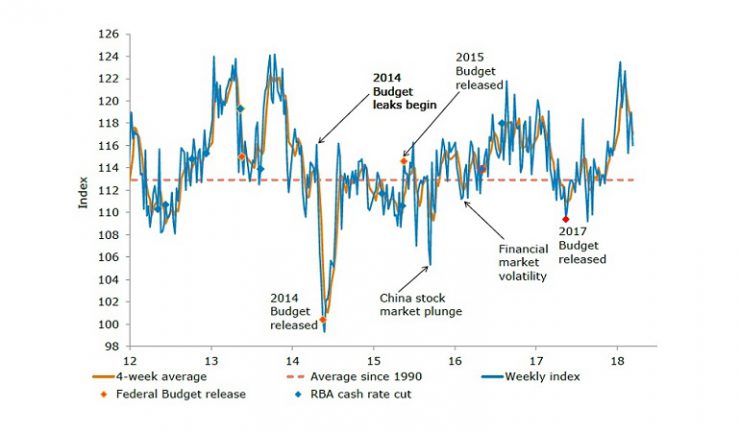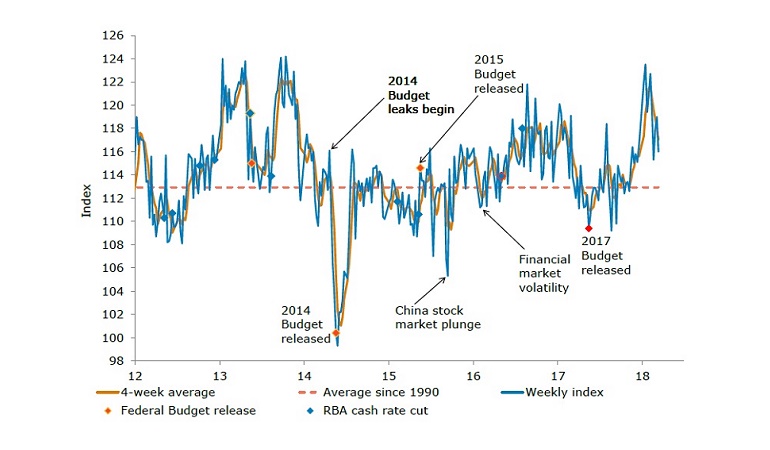Following poor GDP result.
Current financial conditions are still giving Australian households the jitters with the ANZ-Roy Morgan Consumer Confidence falling 2.5% this week, partially unwinding gains over the previous two weeks. The fall was broad based with households particularly pessimistic about financial conditions with the current and future sub-indices falling 5.5% and 1.0%, bringing them to five and 14 week lows respectively. Sentiment around the ‘time to buy a household item’ declined 1.0%, reversing the 0.7% rise in the prior week.
Views towards current economic conditions also declined 3.5%, reversing the previous 5.1% rise. Sentiment around future conditions slipped 1.9%, although the index still remains well above the levels seen for most of 2017, though it has dropped below its long-run average. Inflation expectations edged up to 4.6% on a four-week moving average basis, as the latest reading came in at 4.7%.

ANZ’s head of Australian economics, David Plank, said the broad based fall in sentiment may reflect the weaker-than-expected Q4 GDP number, out last week. “Much of the commentary centred on the fact that living standards per person have gone nowhere over the past year, something that may have resonated with the personal experience of many people. While the number was a touch disappointing, we believe some of the weakness is likely to be temporary and we expect a better performance in 2018.
“We are, cognisant of risks to the downside. The recent strength in household spending seems unlikely to be repeated, given that wage growth is yet to pick up substantially and debt remains high. Households appear to share this concern with views towards future financial conditions falling from their peak in January and are approaching their long-term average. Despite moving lower, confidence remains elevated compared to levels seen through most of 2017. We think it points to some resilience in consumer spending going forward,” he said.
Consumer sentiment remained ‘slightly optimistic’ according the latest Westpac Melbourne Institute Index, rising 0.2% in March. However, Westpac senior economist, Matthew Hassan said the index is still well below levels typically associated with a robust consumer. “It suggests a recovery from last month’s market volatility has been mostly offset by new concerns about longer term prospects for the economy.
“A 0.5% dip in the ‘time to buy a major item’ sub-index, which has been consistently below its long run average over the last few years, points to a continued reluctance to commit to large purchases,” he said.
“These broadly positive monthly moves were almost entirely offset by a 4.1% fall in the ‘economic outlook, next 5 years’ sub-index. The pull back in March may reflect increased tensions around global trade following the announcement of tariff increases on steel and aluminium in the US. Responses to additional questions on news recall this month also suggest increased concerns around the economy relate to developments abroad. The highest recall rate by topic area was news on ‘economic conditions’ assessed as more negative than three months ago. However, the most notable shift was around news on ‘international conditions’ which had the highest recall in 2½ years and was viewed as significantly more negative than in December.”
The ‘time to buy a dwelling’ index edged 0.8% higher in March and showed a clear improvement from its mid-2017 lows. However the index remains well below its long run average of 120, suggesting conditions remain soft overall. Buyer sentiment showed bigger gains in Sydney and Melbourne, bringing these city measures more into line with the national index after being much weaker in previous month.

